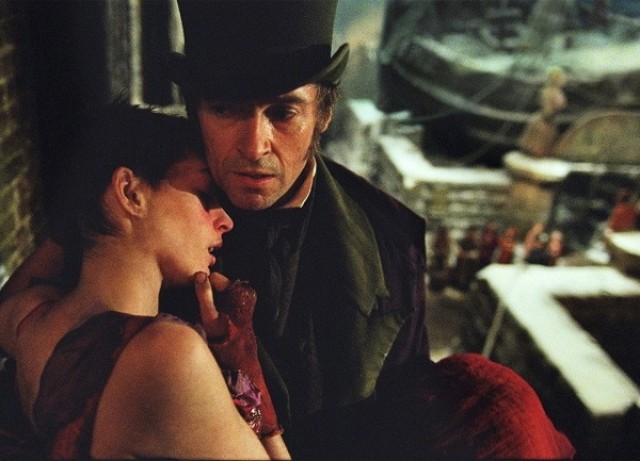
Hugh Jackman tries to provide some kind of saving grace in screen version of hit Broadway musical LES MISÉRABLES
LES MISÉRABLES (Tom Hooper, 2012)
In theaters now
www.lesmiserablesfilm.com
 For more than thirty years, Cameron Mackintosh’s musical theater production of Victor Hugo’s 1862 novel, Les Misérables, has been entertaining audiences in Paris, on London’s West End, on Broadway, and on tours around the world. Fans have been eagerly anticipating the film version for decades, and now that it’s here, they can let out a big sigh of . . . what, relief? Regret? Revolution? Revulsion? Oscar-winning director Tom Hooper (The King’s Speech) has put together a lavish, star-studded spectacle that ends up biting off a whole lot more than it can chew, which doesn’t go over well in the slums of early-nineteenth-century Paris. Hugh Jackman is wonderfully cast as Jean Valjean, a valiant man who has spent nineteen brutal years in prison for stealing a loaf of bread. Russell Crowe tries hard as Inspector Javert, who is determined to bring Valjean to justice after he breaks his suffocating parole. Changing his life — and his name — Valjean becomes a model citizen, even mayor, and seeks to help the disadvantaged, including Fantine (Anne Hathaway), a former employee of his who will do whatever it takes to provide for her young daughter, Cosette (Isabelle Allen). The first half of the film, which goes from 1815 to 1823, develops well enough, with strong, emotional performances by Jackman and Hathaway and a haughty “Master of the House” number led by Helena Bonham Carter and Sacha Baron Cohen as innkeepers taking care of — and taking advantage of — Cosette. But things start falling apart quickly once the story jumps to 1832 and an older Cosette (Amanda Seyfried) has fallen in love with young revolutionary Marius Pontmercy (Eddie Redmayne), while Javert is still hunting down Valjean. The budding romance and coming battle are simply dreadful, as are the songs. (“Do You Hear the People Sing?” We wish we didn’t. “Empty Chairs at Empty Tables”? Alas, just about every seat in the large theater was taken.) The overly melodramatic final scenes, which seem to never end, suck any life that was left over from the first hour or so, which had at least created a compelling mood and intriguing characters. Unable to decide whether it’s a historical epic or a timeless romance, Les Misérables ends up being neither.
For more than thirty years, Cameron Mackintosh’s musical theater production of Victor Hugo’s 1862 novel, Les Misérables, has been entertaining audiences in Paris, on London’s West End, on Broadway, and on tours around the world. Fans have been eagerly anticipating the film version for decades, and now that it’s here, they can let out a big sigh of . . . what, relief? Regret? Revolution? Revulsion? Oscar-winning director Tom Hooper (The King’s Speech) has put together a lavish, star-studded spectacle that ends up biting off a whole lot more than it can chew, which doesn’t go over well in the slums of early-nineteenth-century Paris. Hugh Jackman is wonderfully cast as Jean Valjean, a valiant man who has spent nineteen brutal years in prison for stealing a loaf of bread. Russell Crowe tries hard as Inspector Javert, who is determined to bring Valjean to justice after he breaks his suffocating parole. Changing his life — and his name — Valjean becomes a model citizen, even mayor, and seeks to help the disadvantaged, including Fantine (Anne Hathaway), a former employee of his who will do whatever it takes to provide for her young daughter, Cosette (Isabelle Allen). The first half of the film, which goes from 1815 to 1823, develops well enough, with strong, emotional performances by Jackman and Hathaway and a haughty “Master of the House” number led by Helena Bonham Carter and Sacha Baron Cohen as innkeepers taking care of — and taking advantage of — Cosette. But things start falling apart quickly once the story jumps to 1832 and an older Cosette (Amanda Seyfried) has fallen in love with young revolutionary Marius Pontmercy (Eddie Redmayne), while Javert is still hunting down Valjean. The budding romance and coming battle are simply dreadful, as are the songs. (“Do You Hear the People Sing?” We wish we didn’t. “Empty Chairs at Empty Tables”? Alas, just about every seat in the large theater was taken.) The overly melodramatic final scenes, which seem to never end, suck any life that was left over from the first hour or so, which had at least created a compelling mood and intriguing characters. Unable to decide whether it’s a historical epic or a timeless romance, Les Misérables ends up being neither.